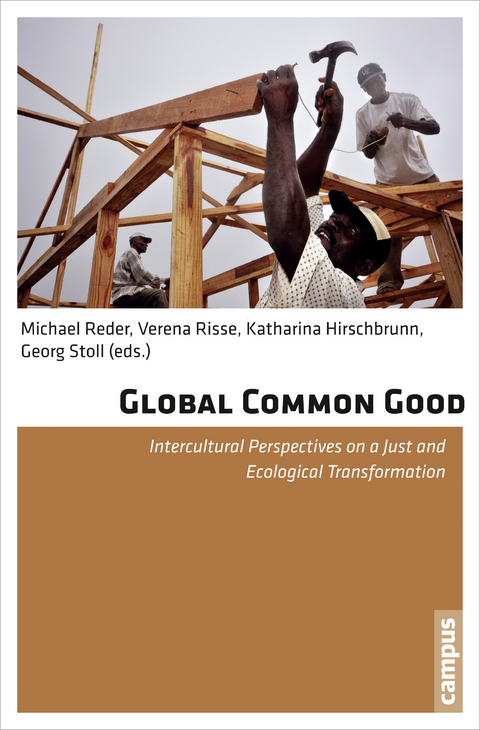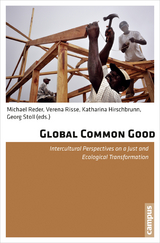Global Common Good
Michael Reder ist Professor für praktische Philosophie an der Hochschule für Philosophie München. Verena Risse und Katharina Hirschbrunn sind dort wiss. Mitarbeiterinnen. Georg Stoll, Dr. theol., ist Referent für Politik und Globale Zukunftsfragen bei MISEREOR.
Contents
I. Systematic Introduction
Towards a Just and Ecological Transformation: Methodological Considerations for an Intercultural Research Project 9
Michael Reder, Verena Risse, Katharina Hirschbrunn, Georg Stoll
II. Perspectives on the Global Common Good from Latin America, Africa, Asia, and Europe
The Peasant Reserve Zones in Colombia as a Contribution to the Global Common Good 17
Olga Lucía Castillo
Biocivilization for Socio-Environmental Sustainability: A Brazilian View on the Hard, but Necessary Transition 47
Cândido Grzybowski
The Common Good and Constitutionalism in Zambia 89
Leonard Chiti
The Global Common Good and the Governance of the Mining Sector in the Democratic Republic of Congo 123
Ferdinand Muhigirwa Rusembuka
Recasting the Development Approach in Indonesia 151
B. Herry-Priyono
Common Good Arrangements in Germany-Ready for Global Challenges? 191
Katharina Hirschbrunn, Georg Stoll, Verena Risse
III. Critical Perspectives on the Intercultural Dialogue Process
Development for the Global Common Good: A Comment 233
Clara Brandi
Development for the Global Common Good: Discussion Points 237
Jan Aart Scholte
IV. Intercultural Reflections on the Global Common Good
Reflections on the Global Common Good: Systematization of an Intercultural Dialogical Research Process 243
Olga Lucía Castillo, Leonard Chiti, Cândido Grzybowski et al.
Views from Civil Society Practitioners 261
Georg Stoll
Contributors 269
Index 271
I. Systematic Introduction
Towards a Just and Ecological Transformation: Methodological Considerations for an Intercultural Research Project
Michael Reder, Verena Risse, Katharina Hirschbrunn, and Georg Stoll
1. Starting Point: Global Challenges and the Post-MDG-Agenda
The adoption of the Millennium Development Goals (MDGs) in September 2000 showed the joint commitment of the UN member states to alleviate poverty and inequality around the world. While several improvements can be noted today, new global challenges call for further action and inform the debate about a Post-MDG development agenda.
Two interwoven sets of challenging problems can be discerned: First, increasing social inequality that denies the satisfaction of basic human needs and a life in dignity to a large part of humanity; secondly, increasing environmental degradation resulting from the overuse of natural resources and the planet's depositing capacities. In the light of global challenges such as poverty, hunger and climate change, the contributions of this volume identify concrete ways towards a socially just and sustainable model of civilization.
The cause of the different global problems has generally been seen in a combination of structural determinants, in particular the exploitation of non-renewable resources, economic policies focusing narrowly on growth as well as deficient political institutions at the national and the international level. At the same time, the last few years were marked by the intention to integrate those concerned into the process of designing the relevant de-velopment policies. This has led to a focus on the way in which ideas and visions influence development. While alternative notions of social de-velopment-like 'bottom-up development' or approaches taking into ac-count the 'limits to growth'-were niche topics of certain social milieus in the past, they have now become part of mainstream debates and of official political agendas. In Europe, this is visible for instance in the work of the Stiglitz-Sen-Fitoussi-Commission in France and the Enquete Commission "Growth, Prosperity, and Quality of Life" in Germany, which both worked on the question of how to conceptualize welfare without relying on GDP only. In addition, numerous books and conferences deal with new ideas and models for societal prosperity and future development. This trend also shows that development is not a goal that is reserved for the Global South. Rather it is also the societies of the Global North that are defective in various respects and need to undergo processes of transformation.
The central question therefore is whether and in what way these discourses in which the norms and values are articulated can actually change social realities. Societies do not only bring forth a plurality of ideas regarding their own constitution and the norms and values that the legal and political institutions should be based on. At the same time, these ideas translate into social practices in diverse ways and yield different practical results.
2. Methodological perspective: Ethical Reflections on the Basis of Existing Social Values and Practices
Political strategies that are justified by reference to different values are not only accepted because of an abstract normative reason but because they are incorporated into social life and into heterogeneous cultural practices. Ethical reflections should therefore be closely connected to these practices, so that moral principles are related to social reality and can claim universal validity. Of course, there exist several social practices with different em-bedded moral norms. Therefore, theories in the tradition of Hegel are asking for complementary moral beliefs, because humans are realizing practical coherence between different moral beliefs in their everyday life.
This view is following Axel Honneth in his interpretation of Hegel. Hon
| Erscheint lt. Verlag | 2.4.2015 |
|---|---|
| Co-Autor | Clara Brandi, Olga-Lucía Castillo, Leonard Chiti, Cândido Grzybowski, Bernard Herry-Priyono, Katharina Hirschbrunn, Ferdinand Muhigirwa, Michael Reder, Verena Risse, Jan A. Scholte, Georg Stoll |
| Verlagsort | Frankfurt |
| Sprache | englisch |
| Maße | 140 x 213 mm |
| Gewicht | 342 g |
| Themenwelt | Geisteswissenschaften ► Philosophie |
| Sozialwissenschaften ► Politik / Verwaltung ► Politische Theorie | |
| Schlagworte | Entwicklungsland • Entwicklungsmodelle • Finanzkrise • Gemeinwohl • Gerechtigkeit • Interkulturalität • Klimawandel • Klimawandel / Klimaveränderung • Nachhaltigkeit • Ökologie • Wohlstand |
| ISBN-10 | 3-593-50318-2 / 3593503182 |
| ISBN-13 | 978-3-593-50318-9 / 9783593503189 |
| Zustand | Neuware |
| Haben Sie eine Frage zum Produkt? |
aus dem Bereich




